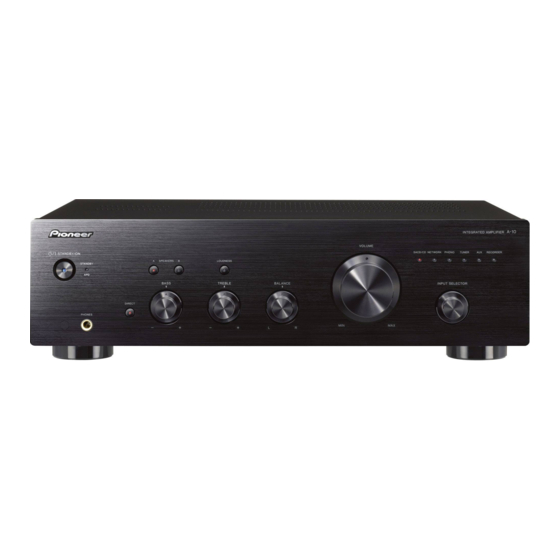Pioneer A-10-K Instrukcja obsługi - Strona 7
Przeglądaj online lub pobierz pdf Instrukcja obsługi dla Wzmacniacz Pioneer A-10-K. Pioneer A-10-K 12 stron.
Również dla Pioneer A-10-K: Instrukcja obsługi (13 strony)

Controls and displays
Chapter 3:
Controls and displays
Front panel
1
2
3
4
6
7
8
9
/I STANDBY/ON
1
Switches the amplifier between standby and on.
When power is turned on, the power indicator in the
center of the button will light.
2
STANDBY/APD indicator
When power is set to standby, the indicator lights red.
When the Auto Power Down (APD) function is on, the
indicator lights green (page 10).
3
SPEAKERS A button/indicator
Use this button to listen to the speaker system
connected to SPEAKERS A terminals.
On : The indicator lights. Sound is heard from the
speaker system. (Sound will also be produced from the
PHONES jack.)
Off : The indicator goes off. No sound is heard from the
speaker system. Set to this position when listening with
headphones.
4
SPEAKERS B button/indicator
Use this button to listen to the speaker system
connected to SPEAKERS B terminals.
On : The indicator lights. Sound is heard from the
speaker system. (Sound will also be produced from the
PHONES jack.)
Off : The indicator goes off. No sound is heard from the
speaker system. Set to this position when listening with
headphones.
5
10
11
12
5
LOUDNESS button/indicator
Use when listening at low volume levels.
On : The indicator lights: Boosts low and high
frequencies to give added punch to playback even at a
low volume level.
Off : The indicator goes off: Should normally be left in
this position.
• This button does not operate when the DIRECT
button is in the on position.
• When sound volume is raised, the amount of
change produced by the LOUDNESS circuit is
reduced.
6
PHONES jack
Use to connect headphones. No sound is produced
when the POWER AMP DIRECT button is ON.
7
DIRECT button/indicator
On : The indicator lights: When this button is set to ON,
sound signals are output directly, without being passed
through the various adjustment circuits (BASS, TREBLE,
BALANCE, LOUDNESS). This allows reproduction of the
signals with greater fidelity, but it disables any settings
made with the BASS, TREBLE, BALANCE or LOUDNESS
controls.
Off : The indicator goes off: The signal passes through
the various frequency adjusting circuits. When the
indicator is OFF, adjustments can be made with the
BASS, TREBLE, BALANCE, and LOUDNESS controls.
8
BASS tone control
Use to adjust the low-frequency tone. The center position
is the flat (normal) position. When turned to the right,
low-frequency tones are emphasized; when turned to the
left, low-frequency tones are de-emphasized.
• This button does not operate when the DIRECT
button is in the on position.
9
TREBLE tone control
Use to adjust the high-frequency tone. The center
position is the flat (normal) position. When turned to the
right, high-frequency tones are emphasized; when
turned to the left, high-frequency tones are de-
emphasized.
• This button does not operate when the DIRECT
button is in the on position.
10 BALANCE control
Should normally be left in the center position. Adjust
balance if the sound is louder from one of the speakers.
If the right side is louder, turn toward the L (left) position
and if the left side is louder, turn toward the R (right)
position.
• This button does not operate when the DIRECT
button is in the on position.
11 VOLUME control
Use to adjust the volume level. (Also allows adjustment
of the headphone sound volume.)
12 INPUT SELECTOR knob/indicators
Turn the knob clockwise or counterclockwise so that the
indicator lights for your desired input source. Turning
the knob clockwise causes the lit indicator to right.
Turning counterclockwise causes it to left.
03
7
En
